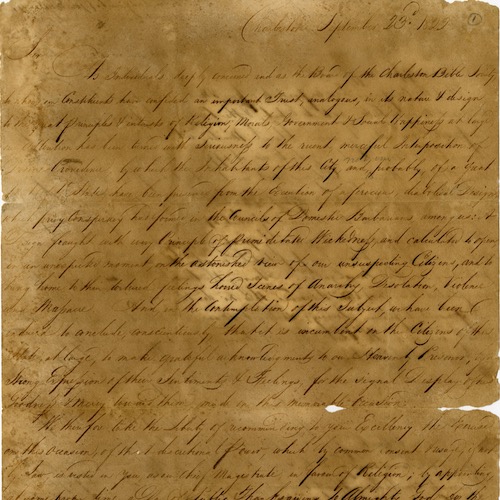About the Collection
The Bacot Family Papers, 1752-1973, collection contains numerous bound receipt books, journals, diaries, correspondences, and financial documents kept by members of the Bacot and Bacot-Huger families.
Two bound diaries in this collection were kept by Julia A. Bacot, 1825-1905, and Julius Motte Bacot, 1859-1899. The Julia A. Bacot Diary covers the year 1820 and contains watercolor paintings, hymns, quotations, and handwritten poetry. Julius Motte Bacot’s diary documents his daily activities in the year 1886 discussing his work as a lawyer, the weather, illness, and social engagements with members of other Charleston families. Other entries talk about weddings, deaths, hunting trips, and property claims following the Civil War. The diary also includes entries on the Protestant Episcopal Church Convention in which discussion formed around the admittance of African American ministers. Finally, Julius Bacot writes about the 1886 Charleston earthquake in which he records the event as it happens and the damages, anxieties, aftershocks and relief efforts following it.
Two bound receipt books in the collection were kept by Daniel Huger, 1779-1858, a South Carolina attorney, Secretary of State, and husband to Sarah Louisa Lance. The books document the receipts written by various employees of Daniel Huger, Charleston merchants he frequented, and money given for various societies and other expenses. Recorded between 1803-1819, the books specifically record receipts for political campaigns, wages for employees, tuition for Daniel Huger’s children, funeral expenses for his son Daniel Huger Jr., payments for the purchasing of enslaved people and money given to the Charleston Library Society and the American Revolution Society.
Also included in the collection are financial documents written by various people regarding the estate of Charlestonian Thomas Wright Bacot, 1795-1851, written upon his death as well as a bound volume kept by Charleston Officer and businessman Robert Dewar Bacot, 1821-1903, Administrator to the estate of Thomas Bacot. The financial documents record proof of payments made from his estate following his death, tax collectors bill, funeral expenses, and financial account papers. The bound volume includes notices for demands against the estate, appraisals for items and belongings, including the appraisal for an enslaved woman named Nancy, and a written statement regarding the distribution of Thomas Bacot’s shares to members of the Bacot family.




